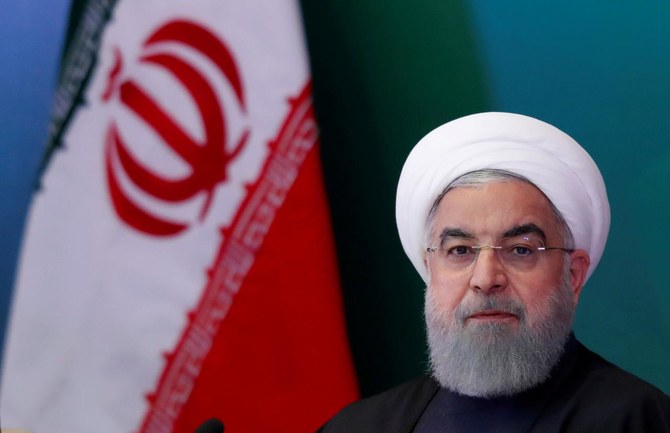
- ARAB NEWS
- 18 Jul 2025

Iranian President Hassan Rouhani was once considered among the most popular political figures in Iran. He won the 2013 elections with a landslide victory, taking 50.71 percent of the vote.
The presidential election did not even proceed to the second round as Tehran’s Mayor Mohammed Bagher Ghalibaf, who finished second, was backed by only 16.56 percent of voters.
In his first term, Rouhani invested a considerable amount of political capital in striking a nuclear deal with six world powers (the US, Russia, China, Britain, France and Germany) and in having sanctions against Iran lifted, including the UN’s four rounds of sanctions and EU and American unilateral sanctions.
The picture looked bright for the president as he also promised ordinary people that the extra revenues would trickle down to them and pledged to improve the economy, people’s living standards, and to provide jobs and equal opportunities, especially for the youth.
Many people also applauded Iran’s improving image and status on the global stage as well as its enhanced ties with the West and the US. That was partially why, in his re-election in 2017, Rouhani also received roughly 51 percent of the vote while his unpopular rival, Ebrahim Raisi, secured approximately 33 percent of support.
Nevertheless, many issues started heading downward after 2017.
A year ago, the Iranian parliament (Majlis) stopped short of impeaching the president. Parliamentarians summoned Rouhani in order to ask him some questions about the nation’s failing economy, the nuclear agreement, and the US’ increasing pressure. Rouhani was the second president of Iran to be summoned by the parliament since 1979.
Later, members of the parliament voted to reject Rouhani’s explanations to four out of five questions. It is likely that Iran will move forward to summon or even impeach Rouhani sooner or later, for the following reasons.
The overwhelming majority of Iranian people want a new Iran, free from a political establishment that diverts their wealth and scarce resources toward suppression, missiles and terrorism.
Dr. Majid Rafizadeh
First of all, Iran’s hard-liners, particularly the Supreme Leader Ayatollah Ali Khamenei, the senior cadre of Iran’s Islamic Revolutionary Guard Corps (IRGC) and conservative lawmakers, are desperately searching for a scapegoat to appease the frustrated public.
Many people in Iran are no longer buying into the regime’s argument that other countries, such as the US or Israel, are the main reasons behind their economic and political woes.
Anger toward the theocratic establishment has reached an unprecedented level. Protests continue to resume despite the brutal crackdowns. Many anti-regime slogans have become the norm; chants include “Death to the dictator,” “Our military brothers, why do you kill your brother?” and “Clerics must get lost.”
And to ensure their hold on power, it has been the modus operandi of the ruling mullahs to often utilize some of their own loyalists or factions as a scapegoat.
Secondly, the hard-liners are cognizant of the fact that there exists no risk in summoning or impeaching Rouhani due to the fact that his popularity has significantly subsided.
People are realizing that under Rouhani’s administration, their country is now facing its most severe economic problems since the establishment of the Islamic Republic in 1979.
Inflation has been rising at an abnormal pace. While an acceptable inflation rate around the world is about 2 percent, Iran’s inflation is rampant and currently hovers over 40 percent. And ordinary people are the ones who are paying the price with skyrocketing costs.
Nafeeseh, a teacher at a high school and a mother of two children, said: “Every day that we buy groceries, the prices of food such as bread, rice and eggs are different from the day before. Prices are constantly going up and it makes it extremely difficult to budget. Within the last year, prices have risen about 70 percent.”
According to official government figures, the unemployment rate is running at around 27 percent among young Iranians and more than 40 percent among those who have university degrees.
Iran has a young population with more than 60 percent under 30 years of age. In some provinces, the unemployment rate is believed to be in excess of 60 percent.
People are also angry at the president due to the fact that Tehran’s regional policy has been no better, with military and missile budgets rising under Rouhani’s administration, leading to an aggressive agenda in Syria, Yemen, Iraq, and other hotspots in the region.
It is no wonder that the overwhelming majority of Iranian people want a new Iran, free from a political establishment that diverts their wealth and scarce resources toward suppression, missiles and terrorism.
And that is why the international community has repeatedly heard Iranians chanting, “No to Gaza, no to Lebanon. We sacrifice our lives for Iran,” “Not Gaza, not Lebanon, my life only for Iran,” and “Oil money has been lost, it has all been spent on Palestine.”
As people’s dissatisfaction and anger toward the Iranian regime grows, the hard-liners are attempting to use Rouhani, the regime’s ultimate insider, as a scapegoat to appease the public.